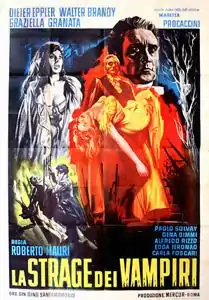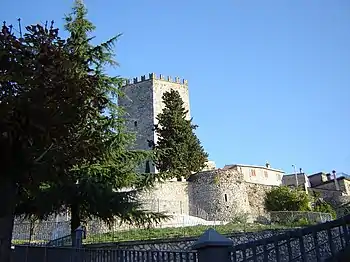| Slaughter of the Vampires | |
|---|---|
 Italian theatrical release poster | |
| Directed by | Roberto Mauri |
| Written by | Roberto Mauri |
| Produced by | Dino Sant'Ambrogio |
| Starring | |
| Cinematography | Ugo Brunelli[1] |
| Edited by | Jenner Menghi[1] |
| Music by | Aldo Piga[1] |
Production company | Mercur Films[1] |
| Distributed by | Mercur |
Release date |
|
Running time | 84 minutes[1] |
| Country | Italy[1] |
| Language | Italian |
| Box office | ₤36 million |
Slaughter of the Vampires (Italian: La strage dei vampiri) (issued in the United States as Curse of the Blood Ghouls) is a 1962 Italian horror film written and directed by Roberto Mauri. The film is set in 19th Century Austria where a newlywed couple move in to a mysterious mansion. During a ball, the wife is bitten by the vampire baron of the mansion.
A low-budget production, so much so that actor Dieter Eppler stated that many cast members went unpaid, the film was released in Italy where it grossed 36 million lira.
Plot
In 19th Century Austria, a newlywed couple, Marquis Wolfgang (Walter Brandi) and Louise (Graziella Granata), acquire a castle. To commemorate the occasion, Louise performs a piano piece she has written during a party. Louise then feels a strange sensation and retires to her room. She is visited by a vampire (Dieter Eppler) who she originally sees at the party she was in and sucks her blood, leading her to desire him. As a result, Louise's health declines, leading to Wolfgang seeking aid from Dr. Nietzsche (Luigi Batzella). Wolfgang is too late as when the doctor arrives, Louise is already dead. As the doctor diagnoses this, Wolfgang is shocked to find Louise alive as she approaches him and sucks his blood. The doctor later seeks out Louise's hiding place and stakes her to death, along with the servant Corrine, also a vampire. Wolfgang's hiding spot is not found as the doctor seeks another abode in the castle. Wolfgang, not entirely converted into a vampire, corners his adversary and stakes him with spikes of an iron grating.
Cast
- Walter Brandi as Marquis Wolfgang
- Dieter Eppler as the vampire
- Graziella Granata as Louise
- Luigi Batzella as Dr. Nietzsche
- Gena Gimmy as Corinne
- Edda Ferronao as Nietzsche's maid
- Carla Foscari as Teresa
- Maretta Procaccini as Resy
- Alfredo Rizzo as a servant
Production

Eppler was cast in the film via an international Dino De Laurentiis production.[2] Through Laurentiis' brother Luigi, Eppler was cast as a police inspector in a film that never started production due to a lack of funds.[2] Eppler described Slaughter as a low budget production with actors not being paid.[2] Filming took place at the Castle d'Aquino in Monte San Giovanni Campano.[3]
Release
Slaughter of the Vampires was distributed in Italy by Mercur Films when it was released on February 6, 1962.[1] The film grossed a total of 36 million Italian lira on its theatrical run in Italy[1] (est. USD$58,452). It was released in the United States on June 4, 1969 as Curse of the Blood Ghouls.[1]
Image Entertainment released a DVD under the title Slaughter of the Vampires in 2005.[4] A second DVD was issued in 2007 by Dark Sky Films with its full runtime but was re-framed to fit 16x9.[3][4]
Reception
In a contemporary review, The Monthly Film Bulletin described the film as "a remarkably un-chilling piece" noting poor acting and dubbing.[5] The review concluded that the film was "so incredibly banal that it almost entertains."[5]
In a retrospective review, Danny Shipka, author of Perverse Titillation: The Exploitation Cinema of Italy, Spain and France, 1960-1980 described Dieter Eppler's vampire character as "one of the campiest vampires in history"[6] The review concluded that the "film is a hoot thanks to some of the most outlandish dubbing ever, making the film appear more like an MST3k episode than a serious thriller."[6]
See also
Notes
- 1 2 3 4 5 6 7 8 9 Curti 2015, p. 76.
- 1 2 3 Curti 2015, p. 77.
- 1 2 Curti 2015, p. 78.
- 1 2 "La Strage dei Vampiri". AllMovie. Retrieved July 29, 2015.
- 1 2 "Slaughter of the Vampires "(La Strage Dei Vampiri)"". Monthly Film Bulletin. London. 34 (396): 47. 1967. ISSN 0027-0407.
- 1 2 Shipka 2011, p. 58.